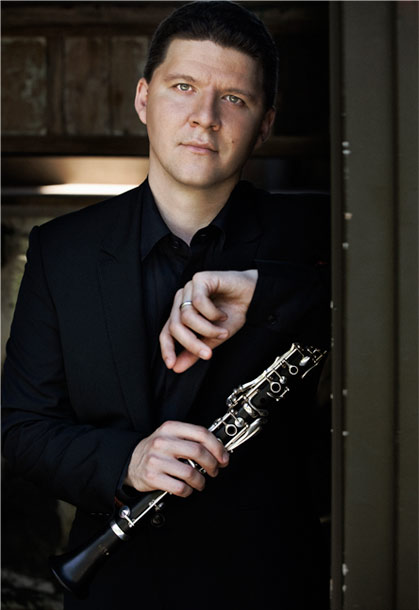Clarinetist Fiterstein sparks opening event in UC Presents’ WW I festival

It was an inspired idea to mark the centennial of World War I with a festival of music composed during the years of the “Great War” (1914-1918). Against the violence and devastation of that armed conflict, the music world was going through a remarkable period of dynamism and tumult.
The University of Chicago Presents series is marking that era this weekend with an interdisciplinary festival, “The Crossroads of World War I and Music,” including five musical events, the first of which was presented Friday night at Mandel Hall.
Even with somewhat uneven performances, the opening program succeeded in casting a wide net from Stravinsky and Elgar to Berg, Poulenc and Granados. Still, it’s unfortunate that no room was found for at least one American work during the weekend. Charles Ives’ “Concord” piano sonata and most of his violin sonatas all date from the war years and would have been a welcome departure from the prevailing Eurocentric lineup.
Also, at just 90 minutes including intermission, Friday’s program felt rather bite-sized with three works less then eleven minutes (though, as it turned out, the shorter works were among the highlights).
The evening began with an excerpt from Granados’s Goyescas. Orion Weiss’s clear-eyed reading of “Coloquio en la reja” was stronger on bold projection than Iberian atmosphere, though the pianist showed admirable poise in keeping his concentration when a clueless audience member’s pop-ditty cell phone ring broke into the hushed final section.
If Granados represented burgeoning Spanish nationalism, the ebbing of Late Romanticism was reflected in Elgar’s Violin Sonata. While pianist Anna Polonsky displayed a consistently strong yet flexible touch Arnaud Sussmann’s violin playing was more variable. With a wirey tone and narrow range of color and expression, the French violinist’s approach sounded impatient and rather superficial, finding little expressive depth or lyric charm.
At just six minutes, Francis Poulenc’s Sonata for Piano Four Hands may be a trifle, but Polonsky and Weiss threw off a delightful performance that captured the mix of Gallic caprice and freewheeling joie de vivre (despite another jarring cell phone interruption).
Great musicians can easily put the lie to the idea that music of the Second Viennese School is cold, ascetic or forbidding. Such was surely the case with Friday’s performance of Alban Berg’s Four Pieces, Op. 5, by clarinetist Alexander Fiterstein and Weiss. Totaling less then eight minutes, these four microbial movements explore a staggering expressive range in tightly compacted form.
Fiterstein brought a robust tone and acute sensitivity to this music. He hurdled all the tortuous technical challenges without breaking a sweat, mining a 12-tone blues quality out of the “Sehr langsam” movement, and plumbing a fine array of dynamic and expressive nuance throughout. Weiss’s keyboard work was on the same supremely idiomatic level.
Stravinsky’s trio arrangement for clarinet, violin and piano of his suite from L’Histoire du soldat (A Soldier’s Tale) concluded the evening. Here too Fiterstein was simply terrific, playing with personality-plus swagger and big gleaming tone. Weiss was equally impassioned and committed while Sussmann sounded out of his league in this company. The violinist played capably with technical competence yet his light timbre and literal approach were simply outclassed by his more fiery colleagues.
“The Crossroads of World War I and Music” continues with concerts at 1:30 p.m. and 4 p.m. Saturday. http://ticketsweb.uchicago.edu/categories/uchicago%20presents
Posted in Performances




